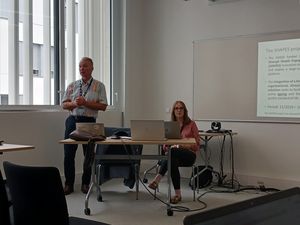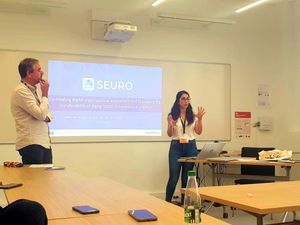SEURO team attended the AAATE Conference in Paris
Mon Nov 06 2023
The 17th International Conference of the Association for the Advancement of Assistive Technology in Europe (AAATE) took place in Paris between August 29th and September 1st. Several members of the SEURO team attended the conference presenting recent developments of their research work, moderating oral presentations or attending workshops.
Julie Doyle (Director NetwellCASALA at Dundalk Institute of Technology [DkIT]) and Work Package 4 lead) represented the SEURO project at the policy session “Towards a European Policy on Person-Centred Digital Technologies in Integrated Care”. The document entitled “Time for change”, was prepared by a European Think Tank on integrated care, coordinated by the SHAPES project and was presented for discussion with a selected group of stakeholders, among which were representatives of the World Health Organisation (WHO), of the European Commission (EC), of the Association of the Advancement of Assistive Technology Europe (AAATE), of the European Association for Service Providers for Persons with Disability (EASPD) and of the EC funded Horizon 2020 SEURO project. The document acknowledges the potential of person-centred technology to boost integrated care, but it also lists recommendations for policymakers that have the responsibility, and opportunity, to change the care landscape in Europe over the next decennia.

A co-design workshop about the SEURO tools was also conducted by Cristian Leorin (Work package 1 lead) and Filipa Teixeira (Work package 2 lead). The SEURO tools, namely ProTransfer (which aims to evaluate the readiness of local/regional organisations to transfer or adopt a digital health solution in their specific organisational context) and the ProBCF-C (a digital checklist of key actions to consider in the design, development, evaluation and commercialisation of any digital health behaviour change intervention [DHBCI]) have been developed to assess the optimisation and transferability of digital health solutions across European countries. The workshop intended to collect feedback from participants, in a role game activity, to co-create and inform the next phase of the development of these two tools. Several points were highlighted and discussed, with a special emphasis being given to the importance of considering the variability of organisational contexts in terms of structure, culture and stakeholder make-up when designing innovations for real-world applications.


